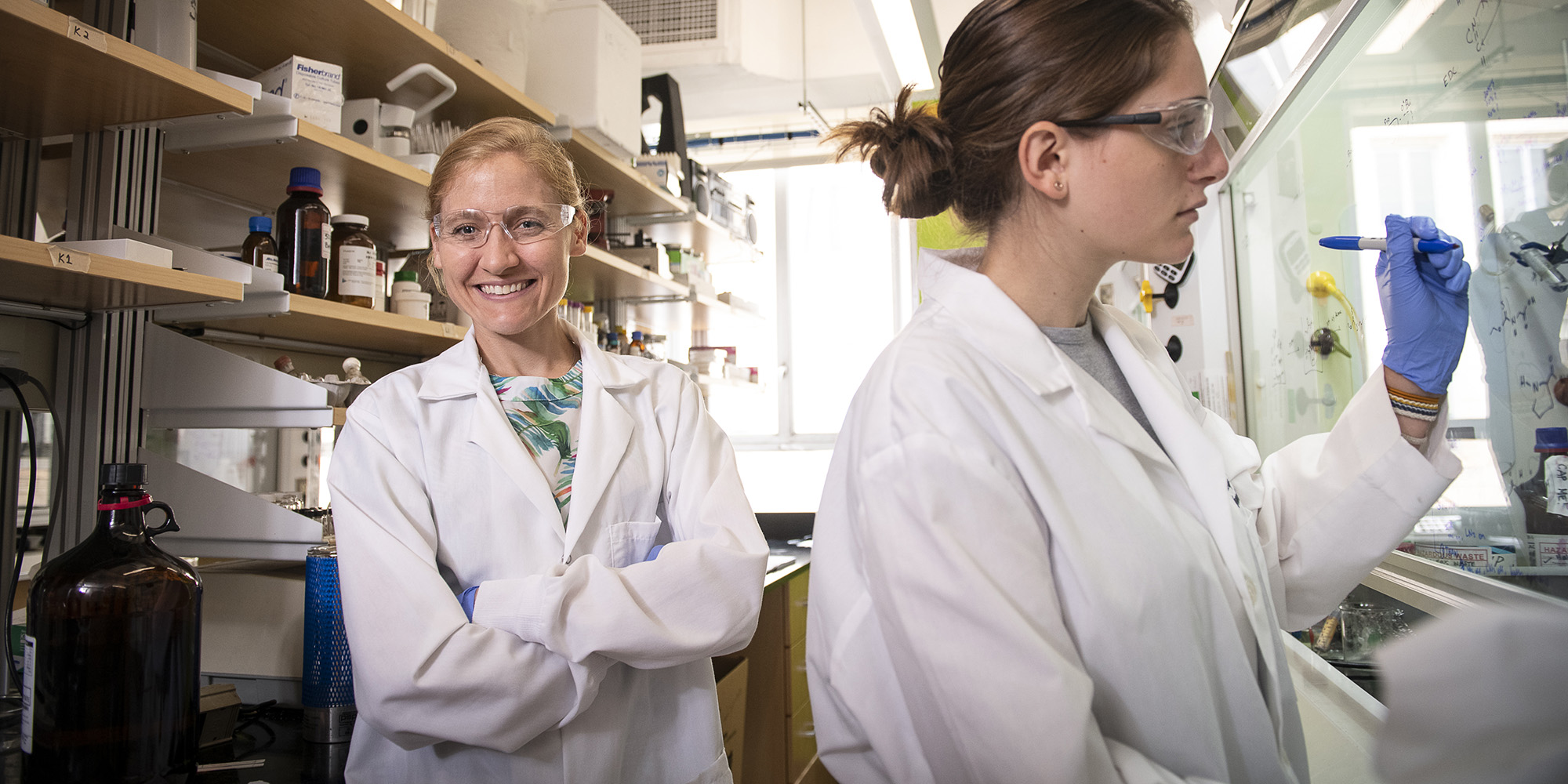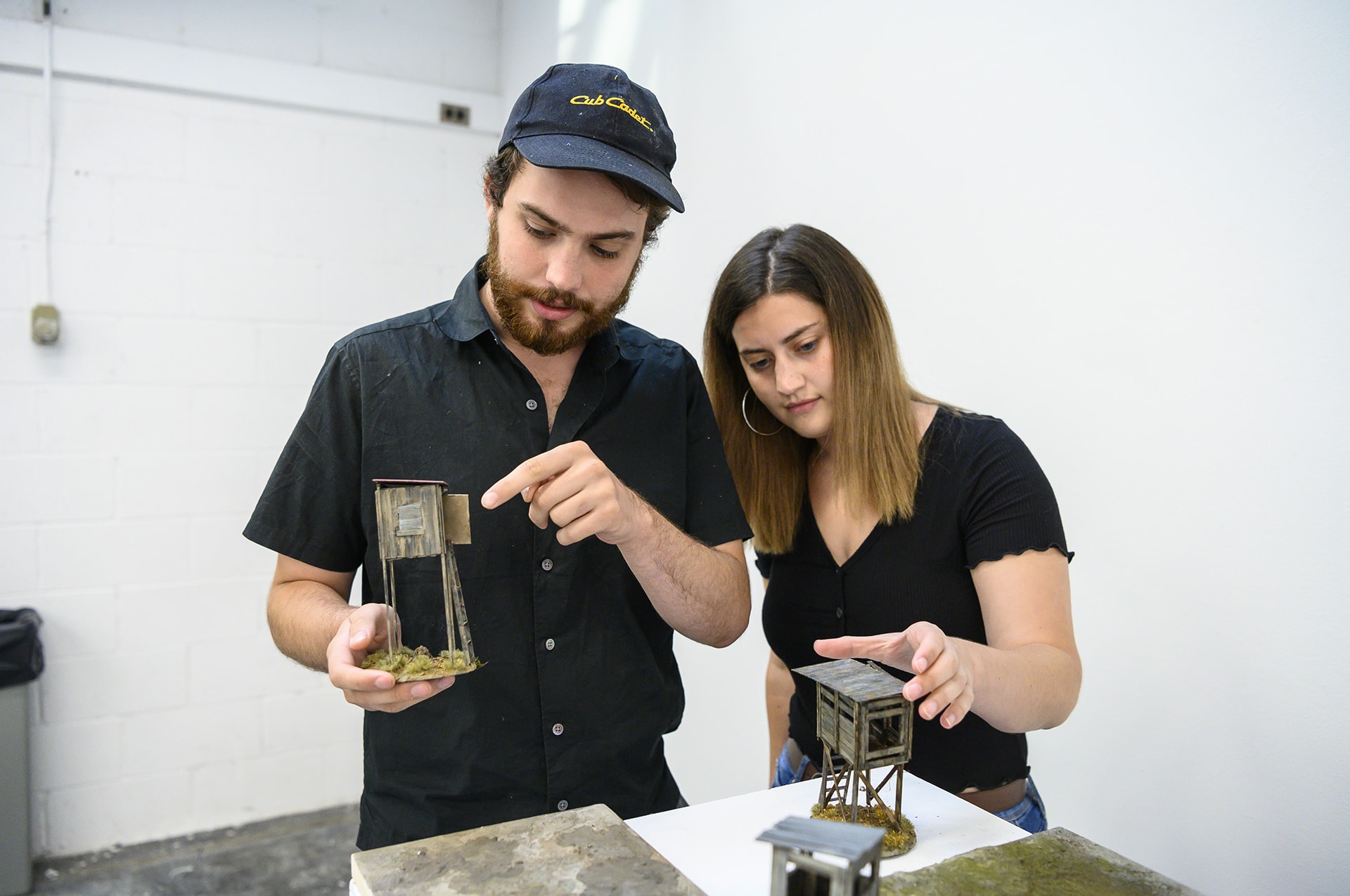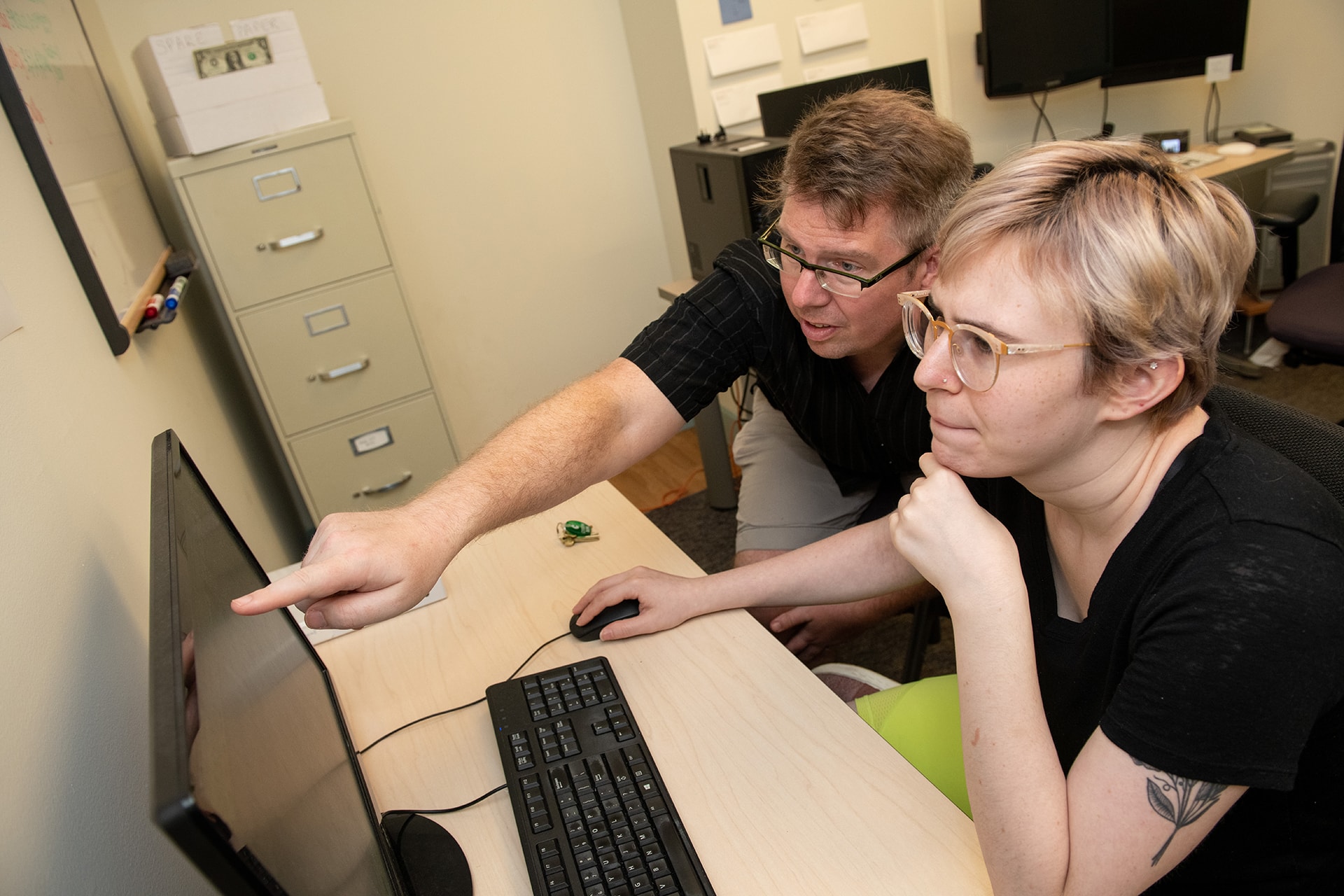High Impact Education
Undergraduate students pursue knowledge, networks, new skills through summer research
Undergraduate research at Carnegie Mellon University goes far beyond lab coats and beakers. It weaves disciplines and provides platforms for bold artistic impressions.
“Learning by doing and real-world problem solving have been core elements of a Carnegie Mellon education since our founding,” said Amy Burkert, vice provost for education. “Involvement in undergraduate research is one of the ways these elements are realized and can be one of the most impactful elements of our students’ experiences. Even early in their training, undergraduates can contribute meaningfully to the research enterprise and learn a great deal in the process.”
In the summer, undergraduates can be found in studios, labs, libraries and navigating the Pittsburgh area working on projects.
"Undergraduate research matters. It's a priority."
 CMU alumna and Assistant Professor of Chemistry Stefanie Sydlik runs a polymer and material research team in the that specializes in the design and synthesis of novel polymers and organic materials. At right is Francesca Starvaggi, a senior in chemistry.
CMU alumna and Assistant Professor of Chemistry Stefanie Sydlik runs a polymer and material research team in the that specializes in the design and synthesis of novel polymers and organic materials. At right is Francesca Starvaggi, a senior in chemistry.
Students working on research in every field of study at CMU have a variety of funding opportunities, including Summer Undergraduate Research Fellowships (SURF), which provides $3,500 for 10 weeks of study; Small Undergraduate Research Grants (SURG), which provides up to $500 for materials; and Presentation Awards to attend conferences. Support for grants and fellowships provided by the Undergraduate Research Office are made possible from individuals, foundations, corporations, departments, schools and the Provost's Office.
"The commitment of the administration is clear: They want to support as many students as possible who express an interest in undergraduate research," said Stephanie Wallach, assistant vice provost for undergraduate education. "If we have more students, we'll find a way to make sure that they can pursue research and receive support. That's what happened this year and every year. Undergraduate research matters. It's a priority."
Stefanie Sydlik, an assistant professor of chemistry, was an undergraduate student researcher at CMU. Today, she guides students in polymer and material research in the same labs where she once studied.
"Conducting research creates a real advantage," Sydlik said. "Carnegie Mellon does an excellent job in connecting students to academic advisers, but having a research mentor provides a close relationship with a senior research scientist who has a vested interest in their success."

Samuel and Isabel Horgan have summer undergraduate research fellowships to work on a multimedia installation called "Down in the Valley, Up and Out of the Furnace: Art in Post Industrial Western PA."
At CMU unlike many other institutions, research includes pursuits of creative inquiry. Samuel and Isabel Horgan, a brother and sister team advised by Art Professor Bob Bingham, are spending the summer studying art in post-industrial Pittsburgh.
Bingham said that art students may not necessarily understand the importance of research when they begin studies at CMU, but that can quickly change.
"It's important for students to learn how intense art making is and how many avenues one can go down looking for inspiration. It's also important to learn how to present and pull data together and to have it manifest into something physical," Bingham said. "When they think through a process from beginning to end, they can realize how they might be able to approach something different or find new pathways of discovery."
When students apply for URO funding, Bingham said, it helps them learn how to write proposals and describe projects.
"Once they graduate, if they're going to survive as an artist they need to find funds and know how to garner money to create their work," Bingham said.
Siblings Samuel and Isabel Horgan, two art majors in CMU's College of Fine Arts, each received SURF grants to spend the summer in Pittsburgh working on their multimedia installation "Down in the Valley, Up and Out of the Furnace: Art in Post Industrial Western PA." The project focuses on cultural phenomena in the Western Pennsylvania region, like whitetail deer hunting, and certain agricultural tendencies. Their project work is done under adviser Bob Bingham.
"We're working really closely with Professor Bingham," Isabel Horgan said. "He's been an invaluable resource to us as a friend and mentor. Working in 3 hour studio classes here has given us the chance to get really close to peers and mentors alike."
Her brother agreed.
"I was interested in coming to CMU because there are more professors here making critical artwork, like research artwork. I was interested in making work like that," Samuel Horgan said.
Interest in undergraduate research is on the rise. Burkert said when President Farnam Jahanian was provost, he encouraged with the development of new approaches to expand student access to research.
"I realized that giving students the opportunity to earn research credit is something that institutionally we could institute quickly and in more innovative ways," Burkert said. The growth of the course enrollments over the last few years indicates SURA is addressing student interest.
“Both President Jahanian and Provost James H. Garrett, Jr., remain committed to broadening access and enhancing the educational experiences of all of our students through involvement in research and creative inquiry,” she said.

Audrey Goodman is working with Erik Thiessen this summer as a summer undergraduate research apprentice in the Infant Language and Learning Lab.
One of the most recent additions to the URO offerings are Summer Undergraduate Research Apprenticeships, known as SURAs. The program awards tuition-free elective credits to enrolled first-year students and sophomores who have little or no experience in research or creative inquiry at CMU. During the summer, they then typically work with faculty on existing projects.
Erik Thiessen, a professor of psychology, said the work he does in the Infant Language and Learning Lab is possible thanks to students' contributions. Undergraduates help with all aspects of his research, which focuses on how infants learn language. He praised the Undergraduate Research Office for working hard in advertising opportunities for students to apply for funding as well as assisting them with the processes.
"Students are really doing a great thing when they participate in research," Thiessen said. "They're doing a great thing for the university, for the faculty for whom they are working, and they are doing a great thing for themselves. It's win-win-win."
Audrey Goodman is a rising junior in philosophy studying linguistics with a minor in psychology, and works with Thiessen under the SURA program. She said the work allows her to combine her interests in a fun way while working with infants and parents.
"I've been able to do concrete work that uses knowledge from both fields to improve knowledge on infant development," Goodman said. "Additionally, my work in this lab has opened my mind to the research possibilities in humanities fields. Overall my work here has given me a concrete idea of what a career in research, specifically in child development, could look like."
Keith Cook, a professor of biomedical engineering and faculty director of CMU's Bioengineered Organs Initiative, studies ways to improve long-term respiratory support for patients with lung disease. Students conducting summer research in his lab have funding from places such as the Department of Biomedical Engineering, the American Heart Association and SURFs.
In addition, the apprenticeship program fills a particular niche, he said.
"Some students don't have access to summer internships, and they're just trying to see what research is like and if they enjoy it," Cook said. "SURA allow us to get something more out of their time and gives us something official on their transcripts or on their resumes."
It also can be the first step to a deeper dive into research.
My goal is to offer the opportunity for more of our undergraduate students to be engaged in research, especially early in their career. It can help them to build more confidence in themselves, solidify and broaden their interests and catalyze their passion inquiry and discovery," Burkert said. "I hope they will then continue on and to extend themselves into academic year research projects, a Summer Undergraduate Research Fellowship (SURF) project and/or other national or international research opportunities."
Seeing the SURA as a building block to SURF and other undergraduate research awards is why the URO decided to create a series of SURA workshops that help students understand what research is and the nature of their summer projects. The workshops culminate with a written proposal that students can use to springboard them forward to a SURG or SURF application in the future.
Students who receive funding from the Undergraduate Research Office this summer will present at CMU's annual Meeting of the Minds on May 6, 2020. The most recent event included more than 700 students presenting posters, artwork, demonstrations and live performances.